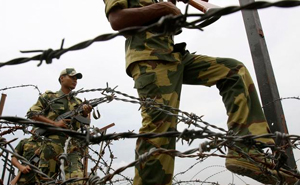
London, Sep 13: The exodus from Bangladeshis into India has for the first time been termed by the United Nations as "the single largest bilateral stock of international migrants" in the eastern hemisphere and also in the developing world.
Data revealed on Thursday by the UN Department of Economic and Social Affairs (UN-DESA) shows that in 2013, India was home to 3.2 million Bangladeshi residents who had migrated into the country and settled there.
Not surprisingly, India was the favourite destination for Bangladeshi migrants in 2013, the report said.
For Indians, however, it was the Middle East that was the clear favourite for migration. Two countries in the Middle East were the main destinations - UAE, having 2.9 million Indian migrants, and Saudi Arabia which had 1.8 million.
However the biggest rise in the number of Indians migrating to a single country was to the US. In 2013, 2.1 million Indians were in the US, which was also home to 2.2 million foreign-born from China and 2 million from the Philippines.
The UN-DESA report said that since 2000, the number of international migrants born in China or India and living in the US had doubled, whereas the number of Mexican foreign-born had only risen by about 31%.
South Asians were the largest group of international migrants living outside their home region. Of the 36 million international migrants from south Asia, 13.5 million resided in the oil-producing countries of west Asia.
The report said more people were living abroad than ever before. In 2013, 232 million people, or 3.2% of the world's population, were international migrants, compared with 175 million in 2000 and 154 million in 1990. The developed countries were home to 136 million migrants, compared to 96 million in the developing countries.
Most international migrants were of working age (20 to 64 years) and accounted for 74% of the total. Globally, women accounted for 48% of all international migrants.
Asians and Latin Americans living outside their home regions formed the largest global diaspora groups. In 2013, Asians represented the largest group, accounting for about 19 million migrants living in Europe, some 16 million in north America and about 3 million in Oceania.
The report, released by UN-DESA's population division, said Europe and Asia combined hosted nearly two-thirds of all international migrants.
Europe remained the most popular destination region with 72 million international migrants in 2013, compared to 71 million in Asia.
Compared to other regions, Asia has seen the largest increase of international migrants since 2000, adding some 20 million migrants in 13 years.
John Wilmoth, director of the division, said, "This growth was mainly fuelled by the increasing demand for foreign labour in the oil-producing countries of western Asia and in south-eastern Asian countries with rapidly growing economies, such as Malaysia, Singapore and Thailand."
In 2013, half of all international migrants lived in 10 countries, with the US hosting the largest number (45.8 million), followed by the Russian Federation (11 million); Germany (9.8 million); Saudi Arabia (9.1 million); United Arab Emirates (7.8 million); United Kingdom (7.8 million); France (7.4 million); Canada (7.3 million); Australia (6.5 million); and Spain (6.5 million).
The US gained the largest absolute number of international migrants between 1990 and 2013 — nearly 23 million, equal to one million additional migrants per year. The United Arab Emirates recorded the second largest gain with seven million, followed by Spain with six million.
Mr Wilmoth said, "Most international migrants settle in developing countries but in recent years they have been settling in almost equal number in developed and developing regions."
The figures are released ahead of a high-level global summit on migration and development to be held by the General Assembly in New York on October 3 and 4.





Comments
Add new comment